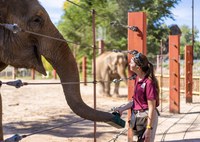Whole Life Care
Nov. 15, 2022 - Aging is a part of life and the ABQ BioPark's animals are no exception. Luckily, they are in good hands.
This includes everything from providing balanced diets, proactive health care, engaging habitats, privacy areas, and environmental and behavioral enrichment throughout animals’ lives.
When animals grow older, they often face issues and ailments similar to those experienced by humans. These ailments may include vision and hearing loss, degenerative joint disease/arthritis, dental issues and loss of strength and balance, among others. Some diseases are more common in certain animals as are some types of cancers and kidney problems. Older animals also have higher susceptibility to certain infections.
The ABQ BioPark has thousands of creatures in its living collection. This includes about 230 mammals, 270 birds and 500 reptiles and amphibians; about 11,000 fish and invertebrates at the Aquarium; and more than 1,000 arthropods at the BUGarium.
Animals that live under BioPark care generally outlive their wild counterparts due to better nutrition, immersive habitats, appropriate social groups and proactive veterinary care.
Special Care for Geriatric Animals
Veterinarians work with keepers and animal managers to provide as much comfort as possible in an animal’s geriatric years.
When an animal ages, the ABQ BioPark provides it with more options. For example, one of the BioPark’s largest residents, Irene, a 55-year-old Asian elephant, is in her golden years. With an animal this size, forming a great relationship with her expert caretakers and veterinary team is the foundation that allows the elephant team to proactively care for Irene.
“The training program for elephants at the BioPark is geared towards each animal being a participant in their own health care,” said Amber Alink, assistant curator to elephants. “Proactive health care mainly comes in the form of carefully planned exercise sessions designed to keep her joints mobile and her muscles toned. Elephants have six sets of teeth that are designed to last their lifetime. Because Irene is on her final set of teeth, we provide a lot of tree branches to her diet to keep her last set of teeth in the best shape possible. Some of the special training sessions we do for her incorporate cutting edge technology like the Piezowave2 Vet machine to treat degenerative diseases. We have seen an increase in her flexibility, especially when she plays with large buoys!”
Kirby, a 32-year-old lemur, is another BioPark resident in his senior years. Staff say they keep most of his furniture low to the ground since he is mostly blind. They also make sure to keep him extra hydrated and do regular body checks on him.
“He loves scratches under his under arm and loves having a regular grooming session with a soft brush,” said Josephine Molina, senior primate keeper.
Tonka the orangutan, another older animal at 42 years old, also gets extra hydration and semi-regular urine collection to check his kidney functions, Molina said.
“Tonka gets lots of extra attention from all of us,” she added. “You will almost never see us not give him extra treats when he asks. He likes to give us his orange peels or celery sticks so we can put peanut butter or honey on them and give back to him.”
Many animals also receive extra bedding so that they’re as comfortable as possible. As an animal’s mobility declines, it may need habitat alterations like smoother terrain or lowered perches. Most BioPark visitors never suspect an animal is geriatric, as animals are very good at hiding any sign of weakness.
Staff may make changes to an animal’s diet as it ages. An animal may receive different nutrients and vitamins based on needs or softer food that is easier to chew.
The ABQ BioPark administers joint supplements to any animals that are suspected to suffer from aging-related joint cartilage erosion. Such supplements can slow the progression of degenerative joint disease, but do not reverse the condition. At times, staff also administers anti-inflammatory/pain control medication to animals that appear to have discomfort moving around their habitats.
The ABQ BioPark’s goal is to minimize any discomfort and ensure the animal is not just existing, but thriving as long as possible.

